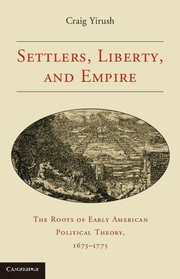Book contents
- Frontmatter
- Contents
- Acknowledgments
- Introduction
- PART I RESTORATION AND REBELLION
- PART II EMPIRE
- 3 Jeremiah Dummer and the Defense of Chartered Government
- 4 John Bulkley and the Mohegans
- 5 Daniel Dulany and the Natural Right to English Law
- 6 Richard Bland and the Prerogative in Pre-Revolutionary Virginia
- PART III REVOLUTION
- Conclusion
- Index
- References
5 - Daniel Dulany and the Natural Right to English Law
Published online by Cambridge University Press: 05 June 2012
- Frontmatter
- Contents
- Acknowledgments
- Introduction
- PART I RESTORATION AND REBELLION
- PART II EMPIRE
- 3 Jeremiah Dummer and the Defense of Chartered Government
- 4 John Bulkley and the Mohegans
- 5 Daniel Dulany and the Natural Right to English Law
- 6 Richard Bland and the Prerogative in Pre-Revolutionary Virginia
- PART III REVOLUTION
- Conclusion
- Index
- References
Summary
The settlers in Maryland had for the most part received what they wanted in the aftermath of the Glorious Revolution. Unlike the inhabitants of Massachusetts, they were happy to embrace royal government, assuming that the rule of a Protestant prince would be superior to that of the Catholic Lords Baltimore. And the years after the fall of the proprietary government were relatively peaceful, with the lower house of assembly able to build on the gains it had made in the seventeenth century and extend its authority against the often ineffectual checks of a succession of royal governors. However, in 1715, after converting to Anglicanism, the Baltimore family resumed control of the colony. Within a few years, Maryland was plunged into a rancorous constitutional conflict over whether the colony could claim the benefit of English law and rights. The leader of the Maryland lower house, the prominent lawyer, Daniel Dulany, drew on the common law as well as the early modern law of nature to defend the colony's claim against the authority of the proprietor.
The Stuart King, Charles I, created Maryland as a proprietorial colony with his 1632 grant to the Catholic courtier George Calvert (Lord Baltimore). Typical of the early English charters, it delegated a large amount of the king's authority to Baltimore. In fact, it was modeled on a fourteenth-century grant to the Bishop of Durham, and the powers it granted were of a quasi-feudal nature.
- Type
- Chapter
- Information
- Settlers, Liberty, and EmpireThe Roots of Early American Political Theory, 1675–1775, pp. 142 - 157Publisher: Cambridge University PressPrint publication year: 2011



